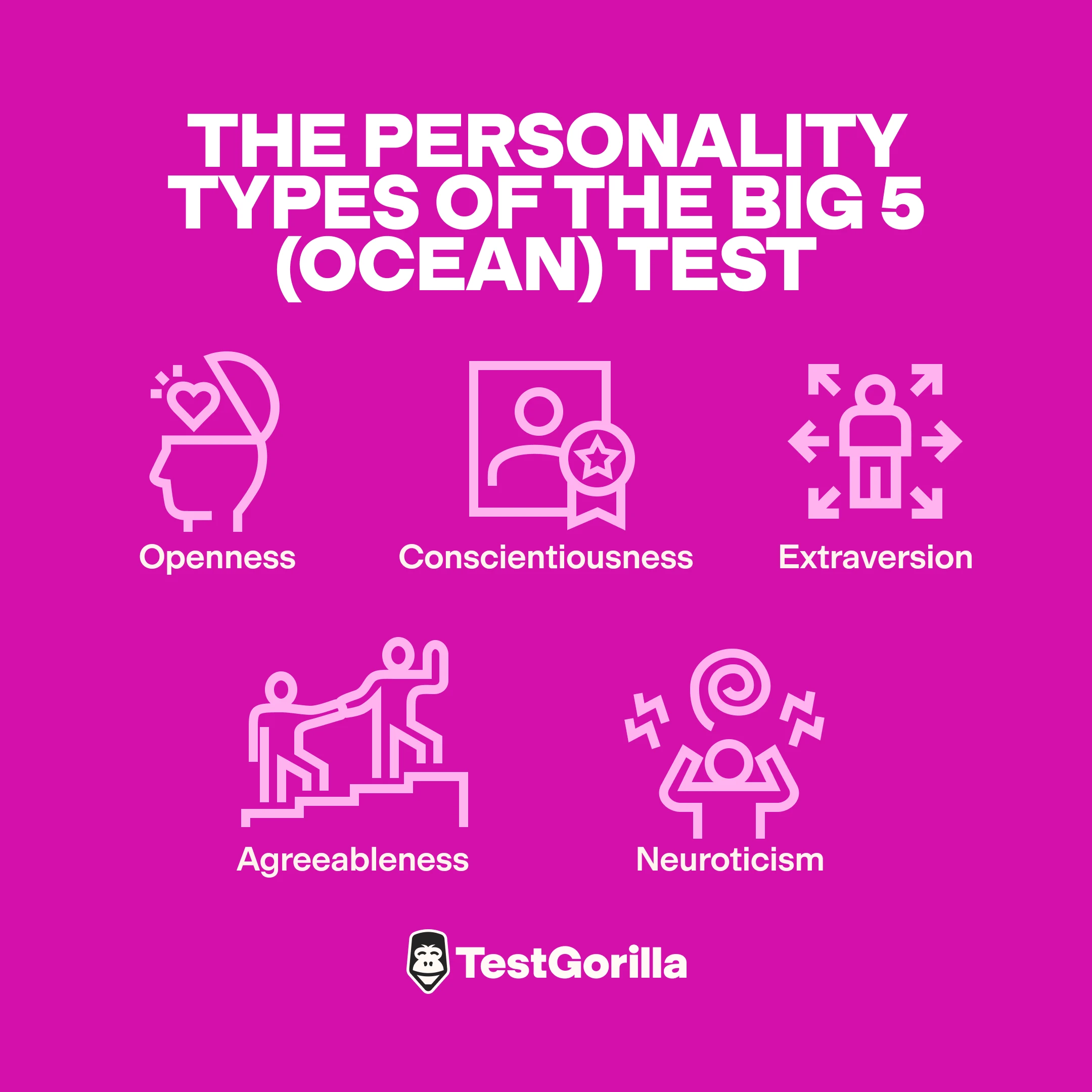How to interpret the results of a Big 5 (OCEAN) assessment
Use our online personality tests as part of a pre-employment assessment
Did you know your candidates’ personalities affect many aspects of their performance in the workplace, right down to how they handle particular situations at work? How about the fact that if candidates are given duties that match their personality type, this can make a difference in their productivity? Personality is important in the workplace, which is where personality tests such as the Big 5 (OCEAN) assessment come into play.
Using a Big 5 (OCEAN) assessment is not the only factor to rely on when assessing your candidates. Further down, we have covered some of the other essential things to consider.
Discovering how your candidates’ personalities align with their particular tasks or duties is worthwhile. In this post, we will focus on explaining the Big 5 personality test. We have also covered:
What a Big 5 (OCEAN) personality types test is
Other reasons why a Big 5 (OCEAN) personality test is important for hiring
When and how a Big 5 (OCEAN) personality test should be used
How to use a Big 5 (OCEAN) personality test the unbiased way
The Big 5 personality traits explained
The advantages of using a Big 5 (OCEAN) personality test
Table of contents
- What is a Big 5 (OCEAN) personality type test and how does it work?
- Why Big 5 (OCEAN) tests are important for hiring
- When and how Big 5 (OCEAN) personality tests should be used
- How to use a Big 5 (OCEAN) personality test the unbiased way
- How to interpret the results of a Big 5 (OCEAN) personality test
- Why Big 5 (OCEAN) personality tests are beneficial to the hiring process
- Reap the benefits of the Big 5 (OCEAN) personality test for your hiring process
What is a Big 5 (OCEAN) personality type test and how does it work?
HR personnel and staff use the Big 5 (OCEAN) personality types test during the hiring process to better understand their candidates’ personalities. It was developed during the 1980s, and is based on an empirical psychological theory relating to five main personality types from the five-factor model theory.
It works by providing your candidates with several statements which they will rank from 1 (disagree) to 5 (agree), to self-evaluate their personality and behavior in line with each statement. The rankings provided by your candidates will put them into a particular personality category, which you can then use to predict how your successful candidate is likely to grow and develop within your team. The test takes approximately ten minutes.
The Big 5 (OCEAN) personality types test is ideal for any job role, but keep in mind that only using this test to evaluate your candidates can lead to a mis-hire, as you would be missing out on other crucial influential factors. We recommend that you use the Big 5 (OCEAN) test, alongside other types of psychometric tests, to inform your interview process, and then gain more information about your candidates.
Why Big 5 (OCEAN) tests are important for hiring
In addition to understanding how your candidates’ personalities align with certain projects and tasks, there are two reasons why Big 5 (OCEAN) tests are important for hiring.
Discover how your candidates’ personalities align with your company values
Using the results of the Big 5 (OCEAN) personality test to find out if your candidates’ behavior aligns with your company culture is useful, but there is another advantage. You can also understand how to build your workplace culture and integrate your successful candidates into your team moving forward.
Given that the most successful companies nurture different personality types in line with their company culture, you must understand more about your candidates’ personalities. This is one reason why the Big 5 (OCEAN) personality test is important.
Use the results as a basis for future training opportunities
Once you have the results of the Big 5 (OCEAN) personality test, you can then use it as a basis to build training opportunities and programs to drive workplace productivity.
For instance, say your candidate has a neurotic personality type. Your training opportunities could be based on building the specific skills that they lack, including team cohesion and collaboration.
When and how Big 5 (OCEAN) personality tests should be used
We recommend that you use the Big 5 (OCEAN) personality test at the beginning of your hiring process. There are two main reasons for this. Not only will this help you to begin planning towards how to manage a particular personality type, but it will also form the basis of your interview process, as we have mentioned.
In terms of how to use the Big 5 (OCEAN) personality test, you should also use custom questions to develop a deeper understanding of your candidates’ behavior in the workplace. There are various types of custom questions, including multiple-choice questions and video options, which will give you more information to work with when selecting your candidates.
Find out how to use our personality tests as part of a skills assessment
Book a free live demo with us to discover the power of pre-employment testing.
How to use a Big 5 (OCEAN) personality test the unbiased way
Before we dive into the Big 5 personality traits explained, there are a few tips we’d like to share about using this test in an unbiased way. First, keep in mind it’s crucial to use the Big 5 (OCEAN) personality tests with other assessments.
If you are hiring a bookkeeper, for example, you can use the Big 5 (OCEAN) test to find out more about your candidates’ personalities, and how they are likely to approach certain projects. But it’s also vital to learn more about your bookkeeper candidates’ hard skills, such as their understanding of accounts payable or accounts receivable with a reliable skills test.
In other words, excluding certain candidates from your hiring process based on their personality traits alone is not recommended. Keep in mind that diverse and inclusive teams perform better.
How to interpret the results of a Big 5 (OCEAN) personality test
Using a Big 5 (OCEAN) personality test at the beginning of your hiring process is important, but how should you interpret the results? Your candidates can be classified into five different personality types. These personality types are:
Openness
Conscientiousness
Extroversion
Agreeableness
Neuroticism
Your candidate can receive a high or low score for each of these five personality types. Take a look at the Big 5 personality traits explained in more detail below.
Openness
The openness trait reflects how willing your candidate is to explore new opportunities and ideas within your organization. The score they receive will determine how ‘inquisitive’ they are in new situations, and how open they are to new ideas.
High openness score – If they receive a high score in the ‘openness’ category, your candidates are willing to take new experiences in their stride. They can be highly creative, bringing new ideas to the table, and often use their imagination to make positive changes in the work environment. A candidate with a high openness score will cope well with changes at work but will struggle with repetitive, mundane tasks that lack creativity and require logic.
Low openness score – If your candidates receive a low openness score, however, they typically prefer methodical and logical approaches to their work. They are also less likely to embrace change, preferring to maintain the status quo in terms of their work style.
Conscientiousness
The conscientious personality trait represents your candidates’ attention to detail and diligence. It indicates how prepared your candidates are, and whether they are likely to work to a particular schedule.
High conscientiousness score – Candidates who receive a high score in the ‘conscientious’ category generally prefer structured, ordered approaches to their work. They are not only ambitious but will also use their determination and preparedness to achieve their goals. Candidates with conscientious personalities are hard workers who use schedules and plans to optimize their work.
Low conscientiousness score – If your candidate has a low conscientiousness score, they might tend to be much more flexible in their approach to work. Structures aren’t always required for candidates with low conscientiousness scores, and they don’t rely heavily on being organized. This might make it challenging for such candidates to meet strict deadlines or manage their time efficiently.
Extraversion
Extraversion as a personality trait measures how well your candidates perform when interacting with colleagues, and how much they gain energy from collaborating with coworkers. It also indicates how comfortable they are sharing ideas with team members.
High extraversion score – If your candidates score highly in the extraversion category, they are typically energized when interacting with co-workers, and tend to be more productive in team discussions. However, working independently might sometimes be a challenge for those who have a high extraversion score.
Low extraversion score – On the other hand, a low extraversion score indicates that your candidates might prefer working independently on projects and achieve their best work working alone. They might tend to struggle with collaborating or discussing ideas with team members.
Agreeableness
The agreeableness personality trait indicates the extent to which your candidates assist others. The agreeable trait can be summed up by the goal to ensure all tasks and interactions with co-workers run like clockwork without problems or errors.
High agreeableness score – A candidate with a high agreeableness score is likely to assist others with challenging tasks. They are also happy to collaborate with team members and work towards resolving problems in the workplace. In other words, their agreeable trait makes them good problem solvers.
Low agreeableness score – If your candidate has a low agreeableness score, they might tend to be more forceful with their opinions. They can be headstrong in their ideas. This means candidates with low agreeableness scores might need to work on being more sympathetic to others’ views and try to ensure they listen to other team members’ perspectives more.
Neuroticism
The neurotic personality trait represents the extent to which your candidates’ emotions influence their judgment at work, as well as their decisions and interactions, and how they carry out their projects. It also refers to whether your candidates can cope well in high-pressure environments, and whether or not they can set emotions to one side in the work environment.
High neuroticism score – Candidates who score highly in terms of neuroticism typically find working in high-pressure situations a challenge. They prefer calmer work environments, which make it easier for them to avoid stress. In high-pressure work situations, candidates with high neuroticism scores are likely to struggle with their emotions and be highly concerned when they make mistakes.
Low neuroticism score – In contrast, if your candidates have a low neuroticism score, they can work in a more stable, predictable way, despite high-pressure situations. Your candidates will also have a more positive outlook in terms of challenging projects and are generally more optimistic. Staying calm where others might become stressed in the workplace comes naturally to those who have a low neuroticism score.
Learn more about your candidates' personality traits with TestGorilla
Sign up for your free plan and get full use of all our online personality tests.
Why Big 5 (OCEAN) personality tests are beneficial to the hiring process
Now we’ve covered the Big 5 personality traits explained, there are a few other benefits you should be aware of when using this assessment. For example, this test will help you:
Understand your candidates’ personalities better in a shorter time frame, reducing your time-to-hire
Determine or make adjustments in terms of the management style you choose for the candidate joining your team, and
Suggest ways that your candidates can improve based on the results of the Big 5 (OCEAN) personality test
Your candidates will understand their strengths better, and tap into their personality traits to enhance their productivity. Your candidates will perform better in the role they’re hired for simply by knowing how they work best.
Additionally, one final advantage of using the Big 5 (OCEAN) test is in cases where you have various HR personnel or staff members evaluating a particular candidate. In situations like these, each staff member might have a subjective viewpoint on a candidate, and the results of a personality test can give some objectivity.
Reap the benefits of the Big 5 (OCEAN) personality test for your hiring process
There are several important reasons to incorporate a Big 5 (OCEAN) personality test into your hiring process. The results are useful for the interview process, planning towards management, enhancing training opportunities, and beyond! Keep in mind that the Big 5 (OCEAN) personality test shouldn’t be used alone. Always back up what you know about your candidates with other information before making that final hiring decision. Avoid hiring biases, and start reaping the various advantages of the Big 5 test by trying TestGorilla for free today.
Related posts
Hire the best candidates with TestGorilla
Create pre-employment assessments in minutes to screen candidates, save time, and hire the best talent.
Latest posts
The best advice in pre-employment testing, in your inbox.
No spam. Unsubscribe at any time.

Hire the best. No bias. No stress.
Our screening tests identify the best candidates and make your hiring decisions faster, easier, and bias-free.
Free resources
This checklist covers key features you should look for when choosing a skills testing platform
This resource will help you develop an onboarding checklist for new hires.
How to assess your candidates' attention to detail.
Learn how to get human resources certified through HRCI or SHRM.
Learn how you can improve the level of talent at your company.
Learn how CapitalT reduced hiring bias with online skills assessments.
Learn how to make the resume process more efficient and more effective.
Improve your hiring strategy with these 7 critical recruitment metrics.
Learn how Sukhi decreased time spent reviewing resumes by 83%!
Hire more efficiently with these hacks that 99% of recruiters aren't using.
Make a business case for diversity and inclusion initiatives with this data.






















